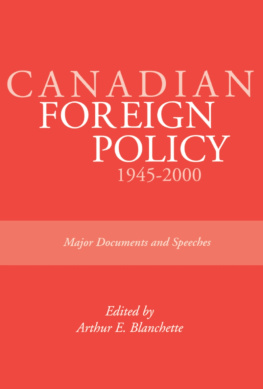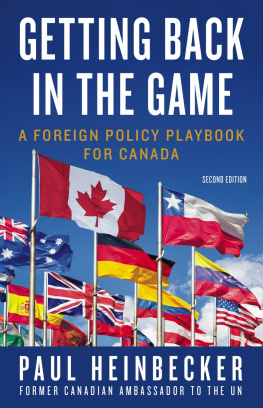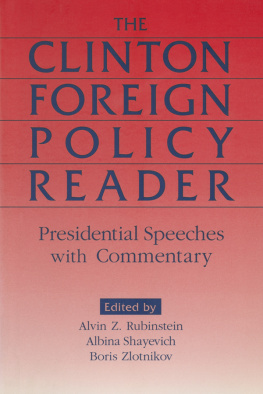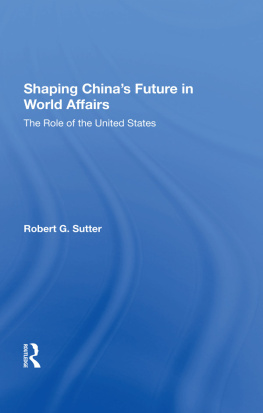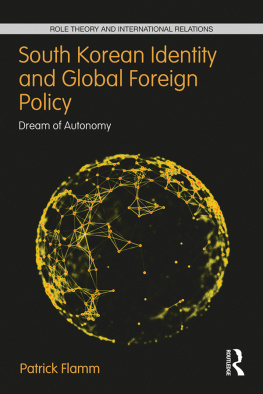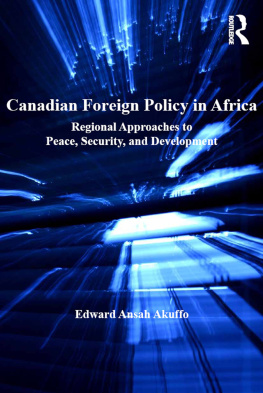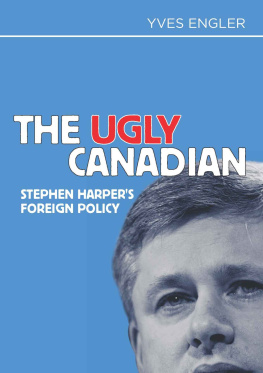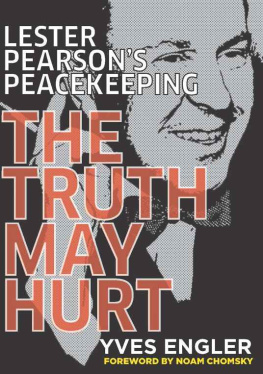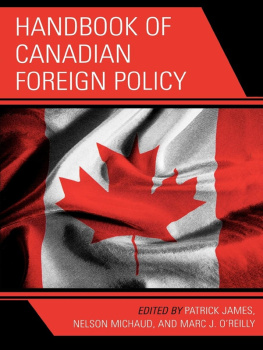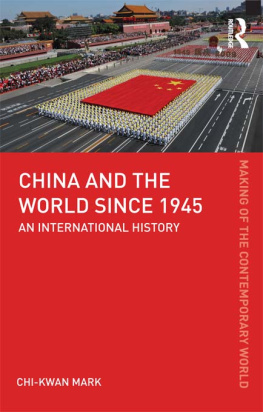Copyright 2000 by Arthur E. Blanchette.
ISBN 0-919614-89-2
All rights reserved. No part of this publication other than in brief form for review or scholarly purposes may be reproduced, stored in a retrieval system, or transmitted, in any form or by any means, electronic, mechanical, photocopying, recording or otherwise, without the prior permission of the copyright holders.
Canadian Cataloguing in Publication Data
Main entry under title:
Canadian foreign policy, 1945-2000: major documents and speeches
(Rideau series ; 1)
Includes bibliographical references and index.
ISBN 0-919614-89-2
1. Canada Foreign relations 1945- -Sources. I. Blanchette, Arthur E. II. Series.
FC602.C6348 2000 | 327.71 | C00-931881-X |
Cover design by The Dundurn Group of Toronto.
Typesetting by Carleton Production Centre of Nepean.
Printed in Canada.
Published by:
The Golden Dog Press is an imprint of Haymax Inc.,
P.O. Box 393, Kemptville, Ont., K0G 1J0 Canada
The Golden Dog Press wishes to express its appreciation to the Canada Council and the Ontario Arts Council for the support these Councils have extended to its publishing programme.
To Alix and Marc
Preface
This volume documenting the highlights of Canadas external relations from 1945 to 2000 complements the four-volume series on Canadian Foreign Policy launched by Carleton University Press in 1971.
A selection of documents concentrating fifty years of Canadian foreign policy into a volume of this size is a task of compression that many will consider restrictive and arbitrary. Dr. Mackay, editor of Volume I, made this point in 1971 in the first of the series and this editor could not agree more. Nevertheless, it is hoped that this book will serve a useful purpose as a handy compendium of the achievements, the great moments, of Canadas approach to the world during the last half of the 20th century.
A number of conclusions can be drawn from this survey. The first, and probably most striking, is that the fundamentals of Canadas foreign policy established between the years 1945 and 1965, especially between 1945 and 1955, are still very much with us today. The decade between 1945 and 1955 was an especially creative one, during which Canada played a constructive and leading role in world affairs. It was a time when our influence was high and our views were heeded.
Canadas shift towards an outward-looking approach to the world during and after the Second World War led to a role of active participation in the foundation of the UNs economic and political system, the General Agreement on Tariffs and Trade (GATT), and the Universal Declaration of Human Rights. Our part in the creation of NATO stands out, as does our influence in the launching of peacekeeping, both within and outside the UN. Canadian views on disarmament, the Colombo Plan, the Law of the Sea, were influential and produced lasting results.
In terms of foreign policy, relations with the United States became a good deal closer after the Second World War, notably in the financial, trade and defence sectors. Currently they represent the highest priority in our external relations. Highlights of the period were such developments as NORAD, the Automotive Pact of the 1960s, the Free Trade Agreement of the 1980s. Energy and fisheries problems became pressing. Long-standing environmental issues related to air and water quality continued to confront us and a new one regarding water exports emerged.
Concomitantly, relations with the countries of the Pacific Rim, notably Japan and Korea, among others intensified, especially towards the end of the period under review.
Prominent new actors have appeared on the foreign policy stage: the Provinces. While the provinces, in constitutional terms, always had legitimate interests in some aspects of external relations, notably trade and immigration, there is no doubt that those involved in our early post-war international activities would be astonished by the extent to which the provincial role has grown and become increasingly influential. Indeed, in some sectors, it is impossible to conduct our foreign policy without them.
Many other issues came to the fore towards the end of the 20th century that our foreign affairs pioneers could not have foreseen, for instance, narcotics, money-laundering, land mines, the economic and financial globalization of the world, cyber crimes with international repercussions. These aspects of current international relations require increasing attention today.
Several of our prime ministers and foreign ministers made their mark in the foreign policy field. It was Louis St. Laurent, actively supported by the Department of External Affairs, who launched Canada on its creative outward-looking post-war course. L.B. Pearsons name is forever associated with peacekeeping, as is Howard Greens with disarmament. John Diefenbaker and Joe Clark were vocal and effective against apartheid. Paul Martin Sr. was an active minister in the UN context, particularly in promoting its enlarged membership and peacekeeping, as well as in developing the Law of the Sea. Pierre Trudeau got off to a lively start with new approaches to foreign policy and defence. His government established relations with Beijing and the Vatican and also paid a good deal of attention to aid and development. Brian Mulroney played a crucial role in the creation of the Free Trade Agreement with the United States, and the NAFTA. Jean Chrtien will be remembered for his trade-oriented Team Canada initiatives and Lloyd Axworthy for his quest for human security. A generation after his father, the current Finance Minister, Paul Martin Jr. is a leader in global finance and monetary affairs.
These volumes are: (1) Canadian Foreign Policy 1945-1954 by R.A. MacKay, Carleton Library No. 51, published in 1971; and (2) by the current editor Canadian Foreign Policy 1955-1965, 1966-1976, and 1977-1992, Carleton Library Nos. 103, 118, and 183, published in 1977, 1981, and 1994, respectively. They are referred to henceforth as R.A.M., and A.E.B. I, II, and III.
See A.E.B. I, pp. xxi-xxiii, for background; also Bout de papier (Volume 16, No. 3, autumn 1999, pp. 21-27), for an account, by the current editor, of the life and times in DEA at mid-century. Bout de papier is published quarterly by the Professional Association of Foreign Service Officers, Ottawa.

